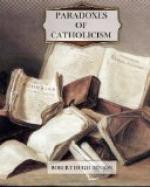For, first, there is the Betrayal of Conscience, as a beginning of the tragedy; its betrayal by those elements of our nature that are intended as its friends and protectors—by Emotion or Forethought, for example. Then Conscience is led away, bound, to be judged; for there can be no mortal sin without deliberation, and no man ever yet fell into it without conducting first a sort of hasty mock-trial or two in which a sham Prudence or a false idea of Liberty solemnly decide that Conscience is in the wrong. Yet even then Conscience persists, and so He is made to appear absurd and ridiculous, and set beside the Barabbas of a coarse and sturdy lower nature that makes no high pretensions and boasts of it. And so the drama proceeds and Conscience is crucified: Conscience begins to be silent, breaking the deepening gloom now and again with protests that grow weaker every time, and at last Conscience dies indeed. And thenceforward there can be no hope, save in the miracle of Resurrection.
This Cross of Calvary, then, is not a mere type or picture; it is a fact identical with that so dreadfully familiar to us in spiritual life. For Christ is not one Person, and Conscience something else, but it is actually Christ who speaks in Conscience and Christ, therefore, Who is crucified in mortal sin.
Let us, then, be plain with ourselves. We are watching not only Christ’s Death but our own, since we are watching the Death of Christ Who is our Life.
THE FIRST WORD
Father forgive them, for they know not what they do.
In previous considerations we have studied the Life of Christ in His Mystical Body from an angle at which the strange and innumerable paradoxes which abound in all forms of life at a certain depth become visible. And we have seen how these paradoxes lie in those strata, so to say, where the Divinity and the Humanity meet. Christ is God and God cannot die; therefore Christ became man in order to be able to do so. The Church is Divine and therefore all-holy, but she dwells in a Body of sinful Humanity and reckons her sinners to be her children and members no less than her saints.
We will continue to regard the crucifixion of Jesus Christ and the Words which He spoke from the Cross from the same angle, and to find, therefore, the same characteristic paradoxes and mysteries in all that we see. In the First Word we meet the Paradox of Divine Forgiveness.
I. Ordinary human forgiveness is no more than a natural virtue, resulting from a natural sense of justice, and if a man is normal, his forgiveness will be a natural and inevitable part of the process of reconciliation so soon as a certain kind of restitution has been made. For example, a friend of mine sins against me—he injures, perhaps, my good name; and my natural answer is the emotion of resentment towards him and, perhaps, of actual revenge. But what I chiefly resent is




